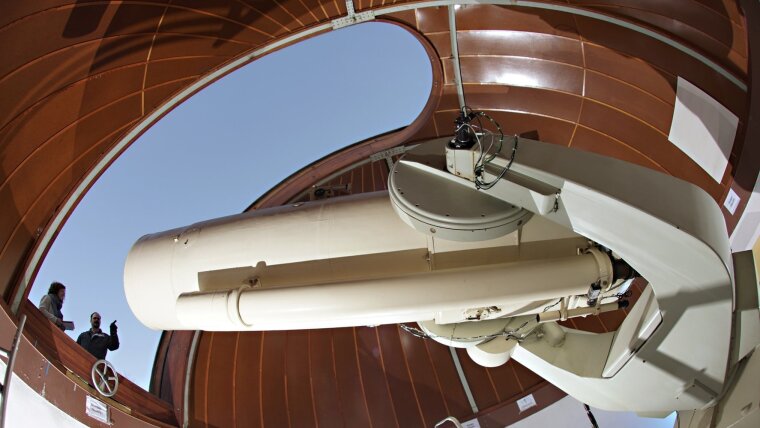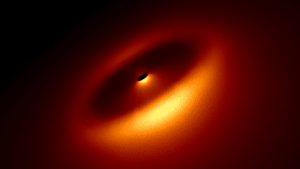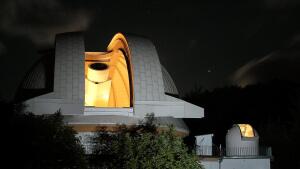
Specialise in Astronomy and Astrophysics
The specialisation in astronomy and astrophysics of the Faculty of Physics and Astronomy (PAF) at Friedrich Schiller University (FSU) Jena takes place mostly at the Astrophysical Institute and University Observatory (AIU) via excellent lectures, seminars and projects. This way, you can peek into the topics of our research groups and experience scientific practise on a day to day basis in the fields of astronomy and astrophysics, all while getting to know our researches.
Here, we want to give you an overview over the different research groups of the AIU and the lectures we offer. A more detailed list can be found on the teaching webpage (German only) de of the AIU de.
Research Groups and Research Focus
Research at AIU is covering terra astronomy, stellar astrophysics, and the study of planets, discs, and their building blocks. The study programme offers you two possible specialisations: in observational astrophysics with a focus on terra and stellar astronomy, or in theoretical astrophysics with a focus on discs and planets.
Study Astronomical Events by Exploring Terrestial Data
The research group on Terra Astronomy de uses various kinds of archival data to study solar and other cosmic events and how they influenced earth. In particular, research involves working with historical catalogs, texts, and illustrations, as well as fossil and biological records (such as tree rings) to understand the past activity of our Sun and other stars, and to make better predictions of future events.
Investigate Extreme Stellar Objects
The research group on Stellar Astrophysics studies the properties of stars. Using direct and indirect methods of observation, they search for nearby isolated neutron stars and their former companions as well as stars in multiple systems, but also for substellar companions like planets and brown dwarfs.
Learn about Complex Interactions in (Extrasolar) Planetary Systems
The research group on Disks and Planets studies the intricate dynamics and interactions of dust, asteroids, planets and other small objects in planetary systems. By analysing these complex systems subject to gravitational and non-gravitational forces, planetary system can be understood better on all their stages of evolution.
Work Hands-On With Cosmic Materials
The research group on Lab & Dust provides a unique blend of experimental physics with astronomy. The properties of tiny dust grains, the building blocks of planetary systems, are studied with state-of-the-art lab tools, including infrared and terahertz spectroscopy.
Work at the Thuringian State Observatory
Research at the Thuringian State Observatory (TLS)External link focuses on the areas stars and planets, and extragalactics. Study the formation of stars and planets, the diversity of exoplanets and the internal structures of stars, or observe comsic events like gamma-ray bursts, as well as galaxies, quasars and galaxy clusters.
Contents of the Specialisation Astronomy and Astrophysics
Recommended Study Plan
| Term | Both specialisations | Observational Astrophysics (OA) | Theoretical Astrophysics (TA) |
| 1st winter term (1st or 2nd M.Sc. term) |
Physics of Stars (8) | Propedeutic Seminar OA** (4) | Celestial Mechanics (6) |
| 1st summer term (2nd or 1st M.Sc. term) |
Physics of Planetary Systems (8) Astronomical Practical Course (6) |
Observing Techniques (6) | Propedeutic Seminar TA** (4) |
| 3rd term | Introduction to Research Work* (15) Project planning* (15) |
Specialization lecture (6) Seminar Observations or Terra-Astronomy |
Specialization lecture (6) Seminar Dust, Small Bodies, and Planets |
| 4th term | M.Sc. Thesis* (30) |
Specialization lecture (6) Seminar Observations or Terra-Astronomy |
Specialization lecture (6) Seminar Dust, Small Bodies, and Planets |
- The lecture and seminar courses during the first two terms are offered each year (ECTS in parentheses).
- The lecture and seminar courses marked with * are mandatory and must be attended.
Of the two seminars marked with **, one must be attended.
Specialisation Lectures
- Cosmology (6)
- Extragalactic Astronomy (6)
- History of Astronomy (6)
- Laboratory Astrophysics (6)
- Milky Way (6)
- Neutron Stars (6)
- Radioastronomy (6)
- Solar System (6)
- Terra-Astronomy (6)
As a rule, these lectures are offered either annually or bi-annually
The teaching and research staff of the AIU will be happy to give individual advice about which courses are useful for your Masters thesis.
Recomended Lectures during Bachelor's Studies prior to Master's
If you are studying your Bachelor's degree here at Jena or already did, we recommend you to take the following lectures and do the projects listed below. These are no requirements.
- 5th term – Introduction to Astronomy
- 6th term – B.Sc. thesis in Astronomy/Astrophysics
Recommended Lectures at the Beginning Master's
At the beginning of your Master's studies, we recommend choosing one of the two specializations:
- Observational / Experimental Astronomy / Astrophysics (Prof. Neuhäuser)
- Theoretical Astronomy / Astrophysics (Prof. Krivov)
Sternwarte 5
07778 Tautenburg

